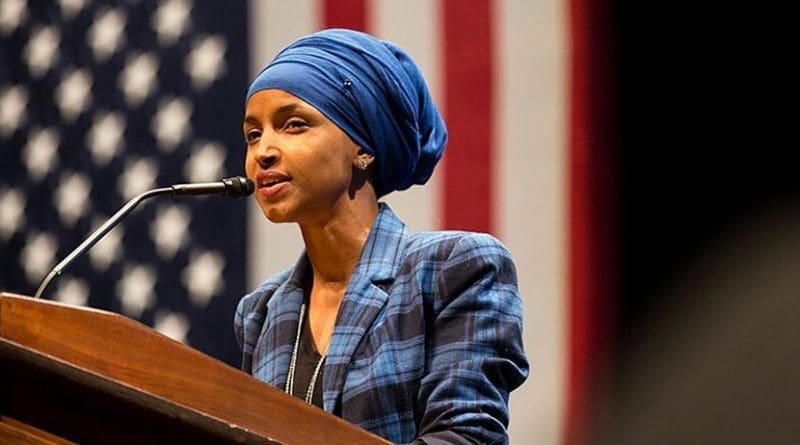Arab Muslim Congresswomen Disrespected By Fellow Democrats – OpEd
By Ray Hanania
One hundred years ago next month, the US Congress passed the 19th Amendment to the US Constitution, which gave women the right to vote — one of the most important aspects of America’s democratic form of government. It was approved by Congress on June 4, 1919, and was ratified and became law on August 18, 1920.
However, despite this law that enshrines gender equality, many American women continue to face discrimination. This discrimination is reflected on many levels, including women receiving lower pay than men for the same work. On average, women only earn 80 percent of what American men earn. Many women are also denied jobs even though they are more qualified than their male counterparts, with more than 40 percent facing gender discrimination.
This raises a real issue of hypocrisy. Many US critics of the Arab world are quick to assert the discrimination that takes place against women there, but are careful to separate America’s gender discrimination. The truth is, women in America who are Arab and Muslim are often excluded in the fight for justice, and they continue to face discrimination. This raises serious questions about America’s claim to be a true democracy and a champion for women’s rights.
America’s Arab and Muslim women are often marginalized, excluded and even vilified because of their cultural ties to the Arab world. We particularly see this in how US society treats the two Arab Muslim women who have risen to the highest levels of power. Reps. Ilhan Omar and Rashida Tlaib were elected to Congress last year but continue to face discrimination.
Emily’s List is the premier Democratic organization that champions women’s rights, supporting “pro-choice Democratic women.” The political action committee asserts that it fights for the equal rights of women, ensuring that their voices resonate and are heard in the US’ political systems. However, it is focused mainly on advocating for the right of women to choose to abort pregnancies, which is one of the few issues distant from Arabs and Muslims because of their strong cultural focus on family values and protections for the unborn. Omar has not been vocal on the issue of abortion, while Tlaib has described herself as being “pro-choice,” according to Vote Smart, which interviews all candidates for Congress using the same issues litmus test.
In conjunction with that goal, Emily’s List has identified 26 female members of Congress it is supporting for re-election. The list includes many well-known women politicians who took office following the 2018 mid-term elections. All of the women have powerful backing and champion mainstream Democratic issues, such as equal rights, pro-choice support of abortion, equal pay, and other progressive issues.
Yet Omar and Tlaib — two of the most high-profile women fighting on the frontlines for civil rights; Democratic women who need support having been under political siege for nearly six months because of their views on the rights of Arabs and Muslims — were not included.
The exclusion of Omar and Tlaib was not an error or an oversight. It was intentional because of their perceived weak advocacy for abortion, but I believe even more so because of their strong advocacy for Palestinian rights and their criticism of Israel. Aside from the issue of abortion, Tlaib and Omar are strong advocates of nearly every other major policy championed by women in the Democratic Party. But, in America, criticism of Israel not only gets you unfairly and wrongly labeled as “anti-Semitic,” it also makes you an easy target for other criticism.
Most of the 26 women named by Emily’s List have strong chances of being re-elected and have embraced the Democratic Party’s mainstream platforms, but they have also been less vocal in their support of what some Democrats consider more controversial issues, such as Palestine, Islamophobia and anti-Muslim rhetoric from the Trump administration. The list includes an Arab-American of Lebanese heritage, Donna Shalala, who has been outspoken in her support of Israel, while her comments on the suffering of the Palestinians have been far less vocal.
Tlaib and Omar’s exclusion is symptomatic of the soft ground that they stand on as Arabs and Muslims who are members of the so-called “progressive” Democratic Party. Since their election, both Tlaib and Omar have been criticized because of their views on Israel’s atrocities against Palestinians, but the Emily’s List exclusion explains in part why the criticism they face has been so ferocious.
Omar has been vilified by Meghan McCain, the daughter of the late Sen. John McCain and co-host of “The View,” the popular women’s program on ABC TV. McCain, a Republican who opposes abortion rights, accused Omar of anti-Semitism, implying she bears some responsibility for the deadly attack on a synagogue in San Diego last month. Meanwhile, Tlaib was also accused of being anti-Semitic after she referenced both her sadness about the Holocaust and the Palestinian Nakba during a podcast this week.
The absence of Tlaib and Omar from Emily’s List is just another example of how Arab and Muslim women are treated differently. It also makes them easy targets for the pro-Israel lobby and pro-Israel activists both in and out of public office.

